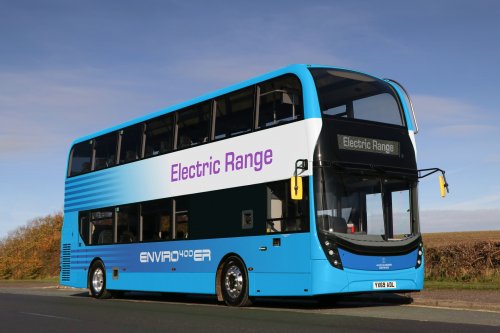ADL has unveiled its vision for a ‘transformation’ of the UK’s bus fleet to maintain the benefits of lower pollution and better air quality towns and cities have experienced during the coronavirus lockdown. Should the bus manufacturer’s vision become a reality, at least 10,000 new low, ultra-low and zero emission buses would enter service in the UK within the next four years, beginning this year.
According to the firm, its proposals are entirely deliverable with the combined resources of the UK’s bus manufacturers and would have immediate benefits before the end of the year, cutting out emissions with electric operation on UK high streets, near schools and at hospitals.
A number of older, pre-Euro VI diesel vehicles could be removed from the nation’s fleet or the new vehicles could be used to boost capacity to enable social distancing.

The coronavirus lockdown has caused traffic volumes to diminish significantly, with the nation collectively staying at home where possible to protect the NHS. With over 60% of UK road transport emissions in normal times caused by cars – compared with under 3% caused by buses – the result has been a drastic improvement in air quality.
ADL Chief Executive Colin Robertson explained: “There is strong public support for locking in these benefits through and beyond the post-coronavirus recovery to keep a healthier environment and continue the fight against climate change.
“Along with active travel and other modes of public transport, buses are a crucial part of the solution. As a society, we need to act immediately and deliver benefits as quickly as possible to minimise the deterioration of air quality when the economy restarts.”
According to ADL, alongside building increased quantities of zero-emission buses, work could begin in parallel to plan and develop the infrastructure required (such as charging stations within depots). Hydrogen buses will play a role for routes requiring additional range, it says, and will be ready for mass production when a fuelling infrastructure and a sustainable supply of green hydrogen have been put in place.
Colin Robertson continued: “The UK Government’s earlier £5bn pledge for buses and cycling recognises the need to invest in active and sustainable models of travel. This is now more imperative than ever as the economy emerges from the impact of coronavirus.
“We urge the UK Government and devolved administrations to speed up the transition to cleaner transport by accelerating the funding earmarked for zero emission buses and assuring health benefits from an immediate positive impact on air quality can be delivered by low and ultra low emission buses that could be in service before the end of this year.”
ADL says that its current UK production capacity of over 1,500 buses per year could be increased to meet the increased demand.
Colin added: “We are supportive of all cutting edge clean bus technologies and recognise that one size does not fit all, which is why we have developed a choice of solutions which meet cities and operators’ individual requirements and priorities – whether that is air quality targets, carbon reduction, interior layouts, acquisition costs, total cost of ownership, or a blend of all of these.
“We have invested tens of millions in innovation – our solutions are road-ready to be delivered at scale with the reassurance that they will perform as required.
“ADL has a proud history of working with the industry, not just for the industry but for the nation.
“We have shared these proposals with senior ministers in the UK and Scottish Governments to show how our industry can lead post-coronavirus economic recovery to deliver health benefits for the entire country. The realisation of our proposals can begin immediately, and they could be scaled up in size and ambition to match councils’ and governments’ decarbonisation targets. We are ready to deliver for the nation.”


